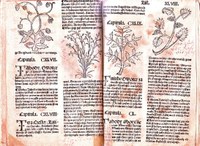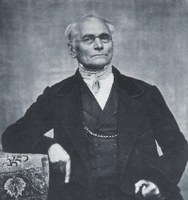The science on the Czech university until the 19th century
 The origins of the scientific doctrine in Czechia date back to the foundation of the University of Prague, the first university in the central Europe. The system of middle-age university was divided into lower, artistic, faculty where arithmetic, geography, astronomy and logic (dialectics) belonged to the so called liberal art. One part of the scholastic education was philosophia naturalis on the theological faculty and traditional knowledge of man on the faculty of medicine. One of the leading personalities in the Hussite era was master Kristan from Prachatice (1360-1439) who occupied himself with the medical and scientific matter and who is the author of essays on astrolabe. Even though the Hussite wars isolated the university and considerably brought it down, the results of the Czech reformation (which originated on the university) inclined to the science and literacy. All this was finalized on the turn of 16th and 17th century. When Tycho Brahe (1546-1601) and Jan Kepler (1571-1630) worked on the Rudolphinian court there was a man in the background, Tadeas Hajek from Hajek (1525-1600), an extraordinary doctor, mathematician and astronomer. The release of his translation of Mattioli’s herbal enriched the original version and became the most expansive scientific publication of its era and also the foundation for other language mutations. With the Rudolphinian era is connected also the university work and the first public dissection performed by the doctor and naturalistic philosopher Jan Jesenius (1566-1621), one of foremen of the Bohemian nobility revolt, executed on the Old-Town square. The scientific and physical papers of the member of the Church of Czech Brethren, the exile J. A. Komensky (1592-1670) belong to the history of European culture as a distinctive synthesis which idea of universal harmony influenced also Leibniz’s encyclopaedism and universalism. Other extraordinary personalities were also the doctor and physicist Jan Marcus Marci from Kronland (1595-1667), the founder of spectrology or the botanist and doctor Adam Zaluzansky from Zaluzany (?-1613). The scientific doctrine stayed a part of the university studies on the artistic (later philosophical) faculty and some branches, like chemistry or physiology also on the faculty of medicine. One of the first initiators of scientific research was in the 18th century J. K. Bohatsch (1724-1768) who occupied himself with zoology and taxonomy. The first chemical laboratory was founded in 1784 in Karolinum by the professor of botany and chemistry J. G. Mikan (1742-1814).
The origins of the scientific doctrine in Czechia date back to the foundation of the University of Prague, the first university in the central Europe. The system of middle-age university was divided into lower, artistic, faculty where arithmetic, geography, astronomy and logic (dialectics) belonged to the so called liberal art. One part of the scholastic education was philosophia naturalis on the theological faculty and traditional knowledge of man on the faculty of medicine. One of the leading personalities in the Hussite era was master Kristan from Prachatice (1360-1439) who occupied himself with the medical and scientific matter and who is the author of essays on astrolabe. Even though the Hussite wars isolated the university and considerably brought it down, the results of the Czech reformation (which originated on the university) inclined to the science and literacy. All this was finalized on the turn of 16th and 17th century. When Tycho Brahe (1546-1601) and Jan Kepler (1571-1630) worked on the Rudolphinian court there was a man in the background, Tadeas Hajek from Hajek (1525-1600), an extraordinary doctor, mathematician and astronomer. The release of his translation of Mattioli’s herbal enriched the original version and became the most expansive scientific publication of its era and also the foundation for other language mutations. With the Rudolphinian era is connected also the university work and the first public dissection performed by the doctor and naturalistic philosopher Jan Jesenius (1566-1621), one of foremen of the Bohemian nobility revolt, executed on the Old-Town square. The scientific and physical papers of the member of the Church of Czech Brethren, the exile J. A. Komensky (1592-1670) belong to the history of European culture as a distinctive synthesis which idea of universal harmony influenced also Leibniz’s encyclopaedism and universalism. Other extraordinary personalities were also the doctor and physicist Jan Marcus Marci from Kronland (1595-1667), the founder of spectrology or the botanist and doctor Adam Zaluzansky from Zaluzany (?-1613). The scientific doctrine stayed a part of the university studies on the artistic (later philosophical) faculty and some branches, like chemistry or physiology also on the faculty of medicine. One of the first initiators of scientific research was in the 18th century J. K. Bohatsch (1724-1768) who occupied himself with zoology and taxonomy. The first chemical laboratory was founded in 1784 in Karolinum by the professor of botany and chemistry J. G. Mikan (1742-1814).
 The center of scientific research and education was the Prague university, i.e. the faculty of medicine and the faculty of philosophy which prepared the teachers. The most remarkable scientist was Jan Evangelista Purkyne (1787-1869) who came back to the Prague University in 1850 as a scholar of pan-European importance from the Silesian Vratislav and during a short time became the leading person of the aborning Czech science. Purkyne’s discoveries and scientific and pedagogical acts influenced the development of world biology and medicine, especially physiology and histology and he raised many disciples who followed in his footsteps on Czech and abroad universities. From Purkyne’s physiology stemmed for example the founder of botanical physiology J. Sachs (1832-1897) who during his studies lived in Purkyne’s family. In the second half of the 19th century grew the need of university educated professionals in the area of state administration, education and health care. The university professors represented the significant authority in society and lobbied for many expert and public issues. This was supported by the still growing number of Czech high schools where the importance of mathematical-scientific education was on the rise. The teachers for those high schools were since 1849 trained solely by the philosophical faculty. The next task of the philosophical faculty was education of pharmacy where the seniors graduated from botany and chemistry in two-years round.
The center of scientific research and education was the Prague university, i.e. the faculty of medicine and the faculty of philosophy which prepared the teachers. The most remarkable scientist was Jan Evangelista Purkyne (1787-1869) who came back to the Prague University in 1850 as a scholar of pan-European importance from the Silesian Vratislav and during a short time became the leading person of the aborning Czech science. Purkyne’s discoveries and scientific and pedagogical acts influenced the development of world biology and medicine, especially physiology and histology and he raised many disciples who followed in his footsteps on Czech and abroad universities. From Purkyne’s physiology stemmed for example the founder of botanical physiology J. Sachs (1832-1897) who during his studies lived in Purkyne’s family. In the second half of the 19th century grew the need of university educated professionals in the area of state administration, education and health care. The university professors represented the significant authority in society and lobbied for many expert and public issues. This was supported by the still growing number of Czech high schools where the importance of mathematical-scientific education was on the rise. The teachers for those high schools were since 1849 trained solely by the philosophical faculty. The next task of the philosophical faculty was education of pharmacy where the seniors graduated from botany and chemistry in two-years round.
Document Actions